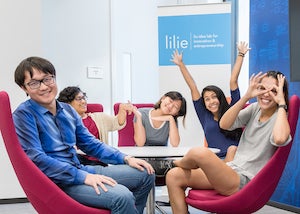The Provost’s Office and the Liu Idea Lab for Innovation & Entrepreneurship (Lilie) have announced the inaugural class of Rice Innovation Fellows, a program that will provide educational and financial support to the next generation of scientist- and engineer-led spinout ventures.
“This is an exciting time for Rice and for Houston as we build the university’s pipeline of translational research to launch from the campus into the community,” Kyle Judah, executive director of Lilie, wrote in a campus announcement.
Provost and incoming Rice president Reginald DesRoches announced the creation of the Rice Innovation Fellows program, the university’s first concerted effort to translate research into new ventures, in fall 2021.
The selected fellows are Ph.D. and postdoctoral students with research breakthroughs that show commercial promise. The program supports their development with equity-free funding, a coworking space and a yearlong program of education and personalized mentorship through Lilie.
“The inaugural cohort of Rice Innovation Fellows represents some of the most exciting research areas and topics across our campus,” DesRoches said. “From new materials reducing food waste and destroying toxic chemicals in our water, to synthetic biology and bioengineering students developing new tools and treatment platforms, these fellows are solving the most pressing problems facing our world in the coming decades.”
The nine fellows are:
Rawand Rasheed, Mechanical Engineering, Ph.D. ’23
Rasheed’s filtration and water capture technology can help buildings reduce energy consumption and cooling towers operate in a more cost-effective way.
Rosa Selenia Guerra Resendez, Systems, Synthetic and Physical Biology Ph.D. ’24
Resendez’s research uses epigenomic editing to re-energize exhausted immune cells, supercharging the body’s immune system and removing a bottleneck in cancer and other CAR-T therapeutics.
Wei Meng, Civil & Environmental Engineering Ph.D. ’22
Meng’s research utilizes carbon nanotubes to create a “second skin” for buildings, airplanes and other infrastructure that easily allows engineers to measure and track structural health and integrity, preventing failure before it turns deadly.
Alfredo Costilla-Reyes, Computer Science postdoctoral research associate ’23
Costilla-Reyes’ cutting-edge artificial intelligence research, AutoML, is already one of the most popular open-source machine learning codebases in the world. Now he’s bringing AI to manufacturing to improve defect detection on production lines in factories of the future.
Neethu Pottackal, Materials and NanoEngineering Ph.D. ’24
Pottackal’s research creates novel coatings for fruits and vegetables that slow decay, cutting into the massive problem of food waste. Inspired by her own allergies, Pottackal has created coatings that are organic and edible for some of the largest produce categories.
James Lee, Systems, Synthetic & Physical Biology Ph.D. ’22
Lee’s research can help revolutionize the early research and development process for life science and pharma companies, using computer vision-enabled microscopes to analyze thousands of cells and other biological products at once, cutting off years of development time and speeding them to market.
Nicolas Marquez Peraca, Physics Ph.D. ’23
Marquez Peraca is exploring the power of carbon nanotubes to transform how batteries for electric vehicles and consumer electronics can manage heat, vastly improving their performance in cold environments.
Bo Wang, Chemical Engineering Ph.D. ’23
Wang has discovered novel chemical compounds that can destroy PFAS, the toxic chemicals found in all our bodies, brains and babies due to plastics in our water supply.
Mei-Li Laracuente, Bioengineering Ph.D. ’23
Laracuente brings together her background as a medical doctor and Ph.D. to develop a novel drug-delivery platform that can precisely control the dosage release, removing one of the major patient pain points — daily medication adherence — in treating diseases from cancer to HIV and mental health disorders.
“These fellows are just the beginning in Rice’s investment to train our science and engineering faculty and students to take their innovations beyond publication and into the real world,” DesRoches said.
The fellows were chosen by the program committee comprised of leaders from the Institute for Biosciences & Bioengineering, the Ken Kennedy Institute, the Smalley Curl Institute and Lilie.
For more information on the Rice Innovation Fellows program, visit https://entrepreneurship.rice.edu/innovation-fellows.

